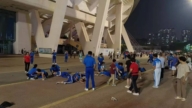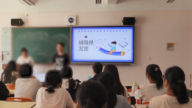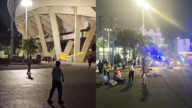【新唐人2013年11月30日訊】中共當局日前就「信訪制度改革」舉辦新聞發佈會,由國家信訪局官員宣佈信訪改革措施,並答記者問。當被問到「黑監獄」問題時,信訪官員表示,那是非正常上訪,與信訪領域無關。發佈會內容在網路公開後,引起網民強烈斥責,訪民們也紛紛對外媒控訴,信訪局用謊言欺騙了中國海內外媒體。
中共中央紀委11月28號公布,信訪局副局長許傑涉嫌嚴重違紀違法,正在接受調查。同一天,中共國務院新聞辦公廳舉辦了新聞發佈會,由信訪局另外兩名副局長宣佈了信訪制度改革的一系列措施。
信訪局官員聲稱,今年7月1號,信訪局開通了網上投訴信訪受理服務,受到了好評,當局將建立全國網上信訪受理平臺,逐漸取代傳統上訪方式。另外,所謂信訪改革措施還包括﹕涉及法律訴訟的上訪不予受理、不支持越級上訪等。
但訪民認為,網上信訪形同虛設。
上海訪民俞忠歡:「我不知道上網多少回了,國務院信訪辦網上面它也有,結果它又是轉到下面去,轉到市裡面,市裡轉到區裏面,區裡轉到鎮裏面。今年7月1號新政實行我是第一個、一號,但是它還是轉到下面去,下面還是不了了之。所以網上信訪確實是一點用處都沒有,沒有人負責的,它轉來轉去。總是在玩訪民。」
中共當局還聲稱,與往年相比,今年信訪總量下降了2.1%,較大規模的集體上訪下降了3.1%,當局認為,這說明瞭信訪秩序有所好轉。網民諷刺:掩耳盜鈴,粉飾太平。訪民指出,信訪局公布的數據是虛假的。
俞忠歡:「現在我們每個禮拜到上海市政府也好,到北京也好,是越來越多,比以前多了好多好多。它(中共)是說假話,它說是少了,從它統計數字來說確實少了,因為好多好多人,都被被它無理的終結了,終結了以後,你到上級部門去上訪,它就是不登記了,它連表格都不給你。」
四川成都的網友指出:不是不想上訪,而是大家都知道上訪無用、失望了、寒心了!上訪率就下降了!
信訪局副局長李皋在回答《法新社》記者關於北京馬家樓地區「黑監獄」提問時,回答說﹕「黑監獄」問題,「不是正常上訪行為,不屬於信訪領域處理的問題。」
對此,網民紛紛質問:甚麼是正常上訪?正常能上訪嗎?能正常上訪嗎?而律師指出,法律里根本沒有規定不允許公民越級上訪。
大陸維權律師唐吉田:「法律沒有規定甚麼是『越級』,按照中國憲法或者其他一些法律規定,公民可以向所在地的政府和一些其他的機構反映自己的訴求,也可以向它的上級,直至向中央來反映,來要求解決,不存在甚麼叫正常與不正常。」
訪民們告訴記者,他們幾乎每個人都是逐級上訪到中央的,很少有人會越級上訪,而北京「馬家樓」、「九敬莊」等黑監獄裏面關押的,也大都是逐級上訪的訪民,也就是信訪局官員口中的「正常上訪」群眾,但他們的權益依然沒有得到絲毫保障。
俞忠歡:「我們程序都走到,上訪的人都知道,哪怕一點小事情也好,總歸是從鎮裏面、區裏面到市裡面,這個程序都要走到底,一級級走下來的話,快的話也要一、兩年。據我了解的人,幾乎沒有越級上訪的,全部是一級級上來的。」
信訪局副局長還聲稱:「不允許打擊報復上訪群眾」、「對於辦學習班、堵截訪行為,發現一起查處一起」、「發現群眾合法權益維護不到位,是要追責的。」
訪民們怒斥當局謊話連篇,並氣憤要求:與撒謊的信訪局局長對話。
採訪編輯/張天宇 後製/孫寧
Petitioners: Officials Lie in the Press Conference
The Communist central petition office, known
as the State Bureau for Letters and Calls (SBLC)
held a press conference regarding petition system reform
yesterday.
When the issue of petitioning for the abolition of black jails
was brought up, the official answered that this is categorized
as an “abnormal petition” and thus has nothing to do
with the central petition.
This comment caused strong rebuke from Chinese netizens.
Petitioners also complain that the petition office
has lied to media both at home and abroad.
On Nov. 28th, the Communist Central Commission
for Discipline Inspection announced the detention of SBLC
deputy director Xu Jie for corruption, and an investigation
is underway.
On the same day, two other deputy directors of the SBLC
held a press conference in regards to petition system reform.
The SBLC officials claimed that since July 1,
the pilot for online petitioning was well received.
The nationwide online petition platform will be established
to gradually replace conventional petitioning.
Other measures in the reform include making
legal and judicial systems petitions, as well as petitions
to bypass the immediate leadership unacceptable.
Petitioners complain that the online petition system is useless.
Yu Zhonghuan, a Shanghai petitioner: “I do not know
how many times I have filled out online petitions,
including on the official SBLC website.
But, they redirected them to the lower office in the city,
to the district, and then to the township.
When the new system came in to effect this July 1,
I was the first one who filed a complaint.
It got redirected to the local (government).
That was it!
The online petition is indeed useless.
No one is in charge.
It only gets redirected and we are being fooled."
Officials also claimed that this year, the total number
of filed petitions fell by 2.1% and large-scale
collective petitions fell by 3.1%, an indication
of the improvement in petitioners’ discipline.
A netizen mocked, “Deception, whitewash".
The petitioner indicated that the SBLC data is false.
Yu Zhonghuan: “There are more and more people going
to Shanghai and Beijing than ever before.
It (the CCP) is lying.
The data is less, indeed, because many cases
were thrown out without reason.
After that, any other further petition won’t be accepted.
They won’t even give you the form for registration."
A Chengdu netizen wrote, “It is not that we don’t do it.
It is because we know it is useless.
We have all been very disappointed.
That is the reason why there are
not as many petitions now!"
In response to an AFP reporter’s question regarding “black
jails" in Majialou, Beijing, deputy director of SBLC, Li Gao,
said, “The ‘black jail’ question…" it is “abnormal petition
conduct, and thus has nothing to do with central petition".
In this regard, netizens questioned,
“What is a normal petition?"
“Why petition if it is normal?"
“How does one conduct a normal petition?"
A lawyer tells us that the law does not restrict petitioners
from bypassing the immediate leaders.
Tang Jitian, human rights lawyer:
“The law does not specify “bypassing".
The Chinese Constitution and other laws have stipulated
that citizens can state their demands and address
their issues to the local government and agencies,
the immediate leaders and the central.
There is no such a thing as normal or abnormal."
We were told by the petitioners that almost everyone
has progressively petitioned to the central,
and few people would do the bypass petition.
The majority of those who were being detained in black jails
have petitioned step by step, i.e., the “normal" procedure.
However, they are still being deprived of their rights.
Yu Zhonghuan: “We walked through the procedure.
Whoever has gone through petitioning knows that
any grievance starts at the town level, then moves
to the district, then to the city.
Walking through all these procedures
takes at least a year or two.
As far as I know, next to no one does a bypass petition.
We all start it from the beginning."
The SBLC also stressed that any attempt to constrain
the public from legal petitioning is prohibited,
and measures to intercept, detain or take revenge
on petitioners will be strictly investigated and punished.
Many petitioners have rebuked the officials for lying and
angrily demand a dialogue with dishonest SBLC directors.
Interview & Edit/ZhangTianyu Post-Production/SunNing



























